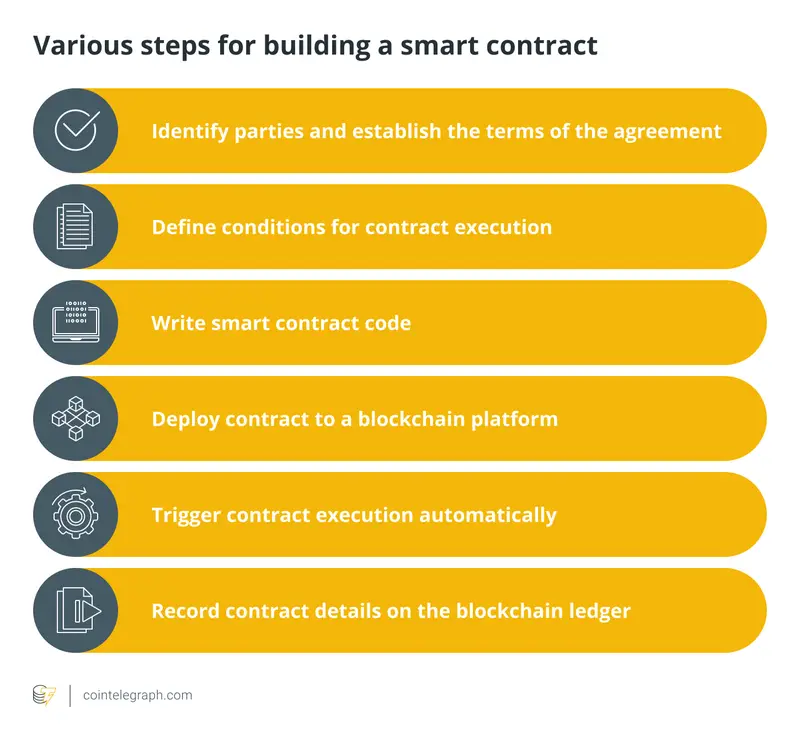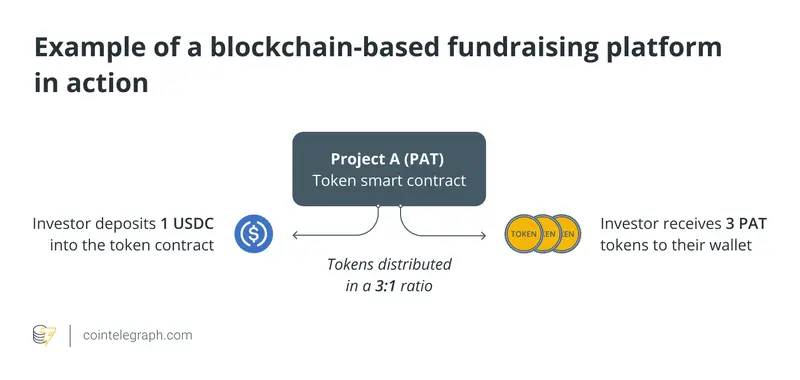How blockchain is transforming fundraising for startups and entrepreneurs
The venture capital world has long been known for its traditional approach to funding and investing in startups. However, the emergence of blockchain technology can potentially disrupt this industry and revolutionize the way venture capital operates.
One significant aspect of this disruption is the tokenization of assets. Blockchain enables the creation of digital tokens representing ownership in assets or companies.
This tokenization allows for fractional ownership and liquidity of traditionally illiquid assets, such as real estate or early-stage startups. It expands investment opportunities, enabling a wider range of investors to participate in ventures by owning tokens, even with small amounts of capital.
Another key aspect is the use of smart contracts. These self-executing contracts with predefined rules and conditions are encoded on the blockchain. Smart contracts can eliminate the need for intermediaries, reducing costs and increasing efficiency.

Investors and entrepreneurs can create and execute investment agreements directly on the blockchain, streamlining the investment process and fostering participant trust.
By eliminating intermediaries, blockchain democratizes access to funding, empowering entrepreneurs globally and attracting investment from a wider pool of investors.
Blockchain technology’s global accessibility transcends geographical boundaries, connecting investors and entrepreneurs worldwide. Startups and investors in emerging markets, where traditional venture capital may be limited, now have greater opportunities.
Blockchain-based platforms also facilitate the creation of secondary markets, allowing investors to trade their tokens representing ownership in ventures.
Alex Strześniewski, founder and CEO of AngelBlock — a decentralized fundraising platform — told Cointelegraph, “With blockchain-based fundraising, tokens representing equity or debt can be traded on secondary markets, allowing investors to exit their investment at any time.” He added:
“This enhances the attractiveness of venture capital investments by providing liquidity and reducing the risk associated with long-term investments.”
Secondary markets provide liquidity to early-stage investors who traditionally had to wait for exit events, such as acquisitions or initial public offerings (IPOs), to realize their investment returns. The ability to trade tokens on a secondary market enhances the overall attractiveness of venture capital investments.
Rachid Ajaja, founder and CEO of decentralized finance (DeFi) platform AllianceBlock, told Cointelegraph, “Traditional venture capital investments involve a higher level of risk and longer lock-up periods for investments, making them less appealing to some investors. Secondary markets allow investors to have the option to exit their positions earlier if they desire, mitigating some of the traditional risks.”
Magazine: ‘Elegant and ass-backward’: Jameson Lopp’s first impression of Bitcoin
Ajaja continued, saying, “Investors are more likely to be interested in participating in the fundraising process when there is a possibility of trading their tokens on secondary markets. This liquidity factor creates a more active and dynamic investment ecosystem, attracting a broader range of investors, which can positively impact a project’s value and utility.”
Blockchain-based fundraising platforms
Blockchain-based fundraising platforms are decentralized platforms that enable users to invest in projects directly. The process usually works by investors depositing tokens into a smart contract that will send a project’s native token to each participating wallet.
For example, if Project A sells Project A tokens (PAT) for USD Coin (USDC) at a 3:1 ratio, an investor will receive 3 PAT tokens to their wallet if they deposit 1 USDC.

Although these platforms operate in a decentralized manner, certain platforms may still necessitate users to verify their identity to adhere to regulatory requirements and safeguard the interests of investors.
This verification process mitigates fraudulent activities and bolsters the platform’s overall credibility.
Some platforms also take additional measures to improve security and trust for users. For instance, noncustodial fundraising platform AngelBlock has a milestone-based compensation strategy with built-in governance measures. Investments are based on whether investors believe a startup has reached a set of predetermined goals.
When these requirements are satisfied, the funds will be released. The platform’s governance is made more democratic by this technique, which encourages user participation.
The protocol employs an on-chain vesting and token distribution method to ensure that tokens are not accidentally transmitted to the incorrect addresses.
Utilizing decentralized fundraising platforms can foster a sense of community and collective objective by enabling direct interaction between a project’s proprietors and its backers.
Several blockchain fundraising platforms integrate governance structures and voting mechanisms. Tokenholders can engage in decision-making procedures using voting, thereby exerting influence over project-related determinations such as the allocation of funds, the direction of the project or significant governance modifications.
Implementing decentralized decision-making processes empowers the community and fosters the alignment of interests among stakeholders.
Strześniewski told Cointelegraph, “Integrating governance structures and voting mechanisms in blockchain fundraising platforms brings a new level of community involvement and transparency to the process. It empowers the community by giving tokenholders a voice in key decision-making processes, such as project development milestones and budget allocations.”
Strześniewski continued, “This aligns stakeholder interests as everyone has a say in the project’s direction and success, creating a mutually beneficial environment where the project’s success directly translates to the success of its investors.”
Democratizing fundraising in the Web3 sector
Democratizing fundraising in the Web3 sector holds immense significance for various reasons. Firstly, it promotes inclusion and access by providing investment opportunities to individuals and communities previously excluded from traditional funding channels.
This democratization breaks down barriers, fostering diversity and innovation by enabling a broader range of projects to receive financial support.
Furthermore, democratized fundraising empowers entrepreneurs by granting them greater control over their fundraising efforts. Instead of relying solely on traditional venture capital firms or angel investors, entrepreneurs can directly engage with a global network of supporters who are genuinely interested in their projects.
This shift in power dynamics allows entrepreneurs to maintain ownership and independence while aligning their goals and values with the interests of their community of supporters.
Recent: Blockchain technology lets East African farmers sell globally
AllianceBlock’s Ajaja said, “Involving a broader community in the fundraising process has multiple advantages. First, it serves as a form of validation. If a large number of diverse investors show interest in a project, it is a strong indication of its potential.”
The CEO continued, “It also contributes to community engagement, as investors are more likely to promote a project they have invested in, creating a network effect that can significantly boost a project’s visibility and reach.”
“In this way, the fundraising process becomes a collaborative effort between the project and its community, driving mutual growth and success.”
Comments
Post a Comment